Is it possible that our modern preoccupation with safety has stripped much of the fun from modern life? Children are no longer permitted to ride automobile running boards until they are flung off, home chemistry sets omit the more interesting lanthanides, and it’s a rare grade-schooler who gets to play with dynamite these days…
Worse yet, this collective embrace of a more sensible, risk-averse approach to life could even be impeding technological progress. It’s no surprise, therefore, that some visionary SF writers have had their protagonists give the one-fingered Mudra of Contempt to putting regulation before pursuing progress at any cost. Such ambition has inspired the following five works.
Frankenstein; or, The Modern Prometheus by Mary Shelley (1831)
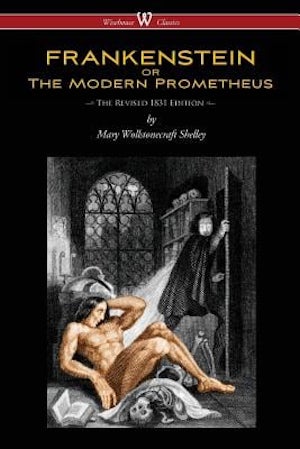
[Note: The 1831 edition of Frankenstein differs from the 1818 and 1822 editions.] Captain Walton is but the latest in the long line of adventurers determined to reach the North Pole. Despite his crew’s skepticism and the ice that even now holds his ship in place, Walton is certain that he will be the first to succeed. How comforting it is, therefore, for Walton to encounter Victor von Frankenstein, a scientist whose ambitions were even grander than Walton’s.
Having discovered a way to imbue dead matter with life, Frankenstein obtained suitable raw materials from graveyards and constructed a new Adam. Despite implementation issues, it cannot be denied that Frankenstein’s creation is an unparalleled success. He is a genius. To know him is to be changed forever.
On rereading this classic novel some years ago, I discovered that Frankenstein’s creation read Johann Wolfgang Goethe The Sorrows of Young Werther, which explains so much about the creation’s character.
Mutant 59: The Plastic Eater by Kit Pedler & Gerry Davis (1971)
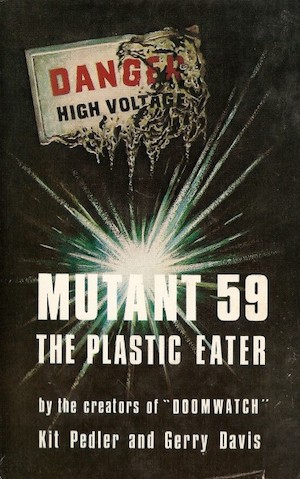
Dr Simon Ainslie set out to save the world from plastic waste. After fifty-nine generations of mutated and selectively bred bacteria, he managed to develop a strain of bacteria that could digest plastic. The solution to plastic pollution lived in his test tube.
Ainslie’s fatal heart attack meant that he would never get to reveal his creation to the world. But the creation revealed itself, thanks to the mishap that sent Mutant 59 down the drain of the laboratory’s sink and into the public sewer system. As his voracious creation began consuming all plastic everywhere—including plastic used to insulate wiring serving vital systems—humanity comes to realize what a gift the late scientist has given them.
Aside from having been written by the same team that created Doctor Who’s Cybermen, the novel may be best remembered for the enthralling scene in which, having inadvertently contaminated the plane he is on with Mutant 59, a scientist desperately tries to save the vehicle from certain destruction.
Blood Music by Greg Bear (1985)
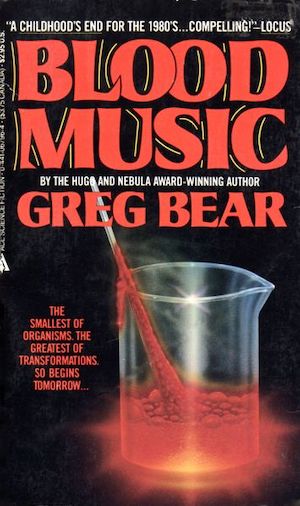
Having laboriously created lymphocyte-derived biological computers, dubbed noocytes, Vergil Ulam has no intention of obeying orders to destroy them. Instead, he preserves his invention by smuggling a sample out of his company laboratory in Ulam’s own bloodstream. It’s a plan that is both simple and effective.
Unlike test tubes, human bodies are notably porous containers. It does not take long for Umal to share his wonderful noocytes with the world around him. Humanity barely has time to grasp the implications of what Ulam wrought before glorious, irreversible transformation is upon them.
Many science fiction inventions are not realizable in the real world and I strongly suspect that Bear’s noocytes are among them. That said, technologies like CRISPR are cheaper and more widely available every year, so perhaps humanity will be lucky enough to experience something as transformative as Ulam’s creation.
Aristoi by Walter Jon Williams (1992)
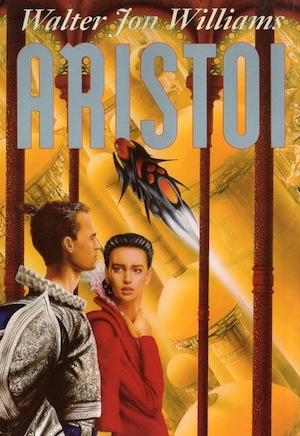
Humanity actually learned from a mishap that destroyed the Earth. Now corralled, nanotechnology provides universal prosperity—but only thanks to the endless labor of the Aristoi, the elite charged with managing this nigh-omnipotent technology.
Aristoi Gabriel discovers to his alarm that some unknown person, undoubtedly a fellow Aristoi, has launched a terrible experiment in an obscure solar system. He attempts to stop it and is thrown in prison. He might be able to escape, but what could he do once outside? As far as he can tell, the only answer is mass warfare (an abhorrent practice long abandoned by galactic civilization). This seems unthinkable, but the alternative may be worse.
Williams is often unjustly overlooked. Part of the reason may be his reluctance to stay with one specific subgenre. This examination of post-humanism, for example, was followed by the futuristic comedy of manners Rock of Ages.
The Daughter of Doctor Moreau by Silvia Moreno-Garcia (2022)
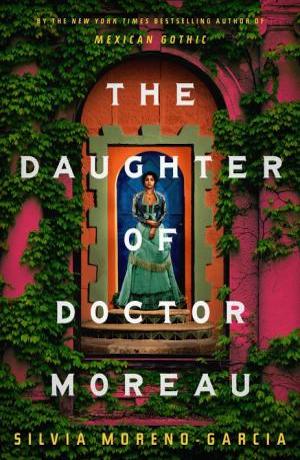
Hernando Lizalde requires loyal, hard-working laborers for his plantation. The dispossessed Maya are too rebellious. The Italians Lizalde imported proved all too vulnerable to Central American disease. Enter the visionary Dr. Moreau, who assures Lizalde that he can transform animals into docile workers given only sufficient funding.
Some years later Lizalde’s son Eduardo arrives to follow up on his father’s investment and disrupts the hitherto peaceful lives of Dr. Moreau and his beautiful daughter Carlotta. Eduardo demands proof that his father’s money has not been squandered. He also resolves that Carlotta will either marry him or serve as his mistress. Carlotta has no intention of being treated like livestock; Eduardo would be wise not to press the issue. He is not wise. Consequences follow.
Eduardo is a fine example of a rich man to whom the word “no” is unfamiliar. To be fair, the real world provides many examples, but rarely one whose learning experience is quite so swift as Eduardo’s.
***
Science fiction loves its visionaries. There are many works about ambitious creators who enjoyed successes of even greater amplitude than the five above. If your favorites were overlooked, feel free to mention them in comments below.
In the words of fanfiction author Musty181, four-time Hugo finalist, prolific book reviewer, and perennial Darwin Award nominee James Davis Nicoll “looks like a default mii with glasses.” His work has appeared in Interzone, Publishers Weekly and Romantic Times as well as on his own websites, James Nicoll Reviews (where he is assisted by editor Karen Lofstrom and web person Adrienne L. Travis) and the 2021, 2022, and 2023 Aurora Award finalist Young People Read Old SFF (where he is assisted by web person Adrienne L. Travis). His Patreon can be found here.










